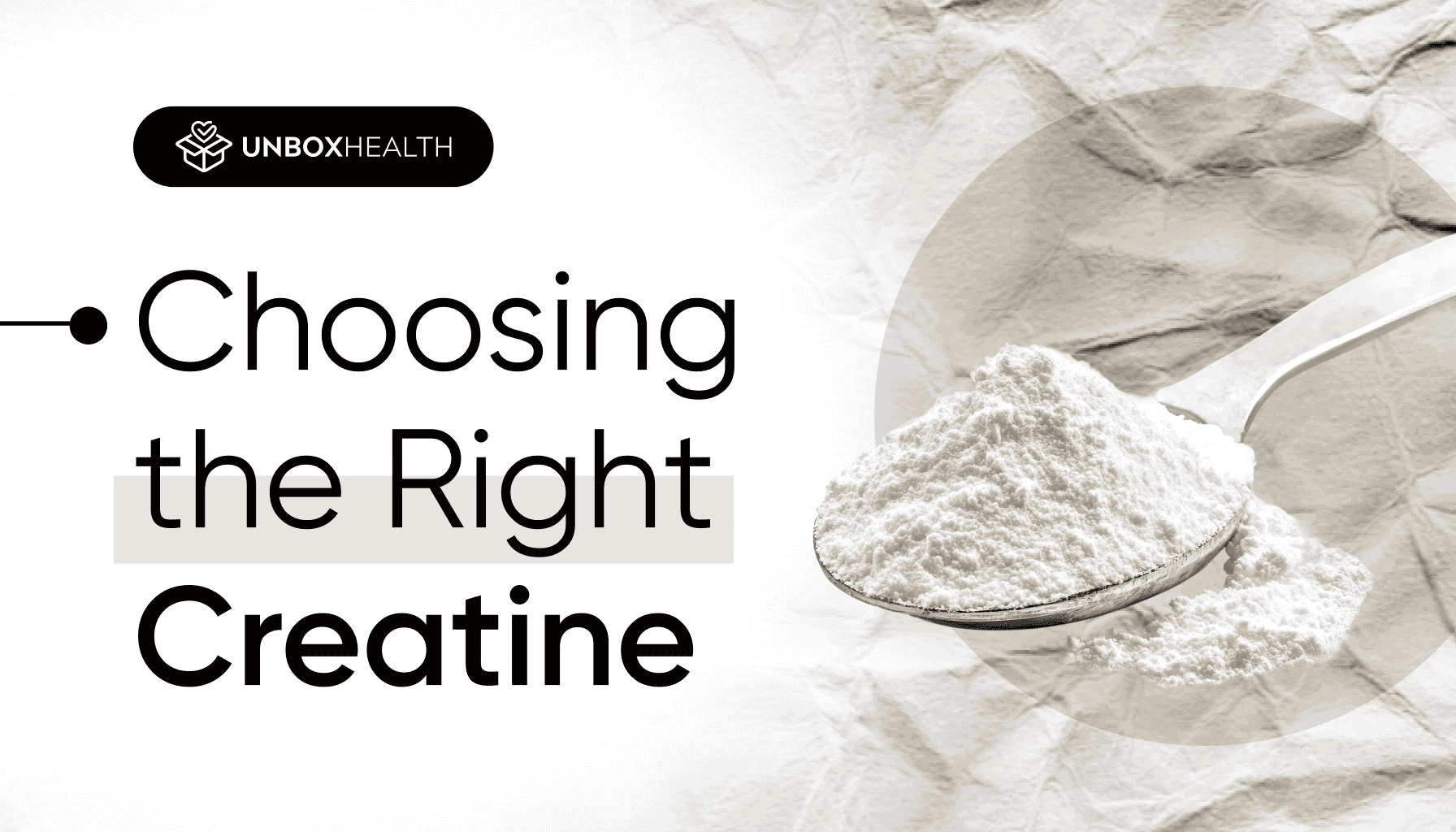If you’ve been lifting weights or scrolling fitness forums lately, you’ve probably noticed creatine is back in the spotlight. But this time, not just for muscle gain.
The rise in creatine-related controversies from suspicious side effects to fake powders laced with harmful fillers has left many wondering: Is creatine still safe? Or is it another health trend gone wrong?
At Unbox Health, we’re cutting through the confusion. Here’s everything you need to know about what’s really happening with creatine, how to choose one that’s safe and effective, and how we help ensure you’re only getting the good stuff.
The Hidden Dangers of Fake Creatine in India: Scientific Perspective
India’s booming creatine supplement market projected to grow at over 32% CAGR from 2025 to 2030 has led to a surge in demand, especially among young fitness enthusiasts and athletes 1. However, this rapid growth has also attracted counterfeiters and unregulated manufacturers, leading to significant health risks for consumers.
Scientific Benefits and Safety of Genuine Creatine
- Creatine is one of the most researched and effective sports supplements, with hundreds of studies confirming its benefits for muscle strength, high-intensity exercise, muscle recovery, and even brain health (2)
- Creatine monohydrate is the most studied and proven form, with long-term clinical trials (up to 5 years) showing no adverse effects in healthy individuals (2).
- It’s mechanisms are well understood: creatine increases phosphocreatine stores in muscles, supporting rapid energy production during intense exercise (2).
- Research also suggests benefits beyond muscle, including improved cognitive function and potential neuroprotective effects (2).
Risks Associated with Fake or Adulterated Creatine
Despite creatine’s excellent safety profile when pure, fake or contaminated products pose real dangers:
- Unknown or Harmful Ingredients: Counterfeit supplements may contain fillers (e.g., sodium bicarbonate, sugar alcohols), banned substances, or even toxic chemicals not listed on the label. These can cause allergic reactions, digestive distress, or worse (3,4).
- Contamination: Unregulated products are at higher risk for contamination with heavy metals, microbes, or other hazardous substances, which can harm kidneys, liver, and overall health(3,4)
- Mislabeling and Under-dosing: Many fake products overstate creatine content or hide problematic additives, leading to ineffective dosing or unexpected side effects(3)
- Kidney and Digestive Issues: While pure creatine is safe for healthy individuals, adulterants or contaminants can stress the kidneys and digestive system, especially with chronic exposure (2,3).
Scientific Consensus and Regulatory Gaps
- The scientific community is clear: creatine monohydrate, when sourced from reputable manufacturers and taken at recommended doses (3–5 grams per day), is safe and effective for most people(2).
- However, dietary supplements are not regulated as strictly as medicines in India or globally, making it easier for counterfeit or substandard products to enter the market. (2,4)
- Independent lab testing and verification are essential to ensure product purity and safety, especially in markets with high rates of supplement fraud.(4) At Unbox Health, our testing protocol for creatine supplements goes beyond surface-level checks.
- We rigorously lab-tested creatine content through quantitative analysis, ensuring the product’s stated composition matches the actual contents.
- Comprehensive toxicity profiling is conducted to assess potential adverse effects, while trace heavy metals—including lead, arsenic, cadmium and mercury—are meticulously screened using advanced spectrometry techniques.
This multi-layered approach eliminates guesswork and guarantees that each product meets stringent safety and quality standards.
FAQ Title
Is creatine safe for long-term use?
Yes. Clinical studies over 5+ years show that creatine monohydrate is safe for healthy individuals when taken at recommended doses (3–5g/day). The key is purity and proper sourcing. Always consult your healthcare professional before adding anything new to your regime.
How can I spot fake creatine supplements in India?
Look out for missing batch details, super-low prices, powder that tastes sweet or gritty, or vague ingredient labels. Always choose brands that undergo independent lab testing and share lab reports openly.
What’s the best creatine supplement in India right now?
The best creatine is one that’s lab-tested, unflavoured, and 100% pure monohydrate. Check Unbox Health’s creatine product ratings to find safe options backed by real testing, not just claims.
Check out unbiased lab-tested ratings of “Creatine Supplements” on Unbox Health along with their detailed lab reports.
Always check independent ratings before making a purchase. Unbox Health help you cut through the marketing hype and choose the best oil for your health and your kitchen.
About Unbox Health
Unbox Health: India’s First Ratings Platform for Packaged Foods and Health Supplement Tired of biased reviews and never-ending claims? At Unbox Health, every product is tested at multiple premium FSSAI-approved NABL-accredited international labs – 100% independently, transparently, and without any brand involvement.
- 100% Transparency: All lab reports are publicly published.
- Zero Hidden Agendas: Products are market-bought with no brand involvement.
- Accurate Testing: Samples tested at up to 3 premium international labs
- Actionable Ratings: Based on Label Accuracy, Toxicity & Nutritional Profile.
Head over to Unbox Health and let the data guide your consumption choices.
References:
- https://www.grandviewresearch.com/industry-analysis/creatine-supplements-market-report
- Antonio, J., Candow, D. G., Forbes, S. C., Gualano, B., Jagim, A. R., Kreider, R. B., Rawson, E. S., Smith-Ryan, A. E., VanDusseldorp, T. A., Willoughby, D. S., & Ziegenfuss, T. N. (2021). Common questions and misconceptions about creatine supplementation: what does the scientific evidence really show?. Journal of the International Society of Sports Nutrition, 18(1), 13.
-
Gualano et al., 2012, Creatine Supplementation: Evaluation of Safety and Effectiveness.
-
Kreider et al., 2017, International Society of Sports Nutrition position stand: safety and efficacy of creatine supplementation
